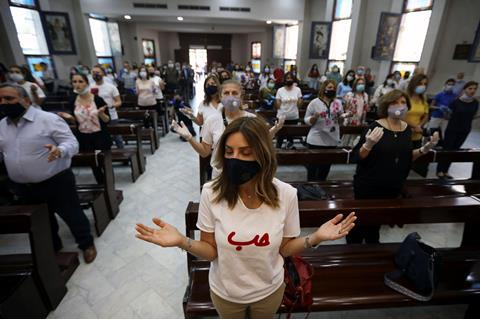Churches in England are no longer required to enforce mask wearing inside their buildings. But some leaders are still asking parishioners to remain masked. Sarah Phillips believes this policy is having a detrimental effect on the spiritual health of congregations. She explains why

With restrictions lifted this week on the mandatory wearing of face masks in public places, including places of worship, many churches will be going through the difficulty of deciding how to proceed with the wearing of face masks in church services.
Naturally, church leaders may be inclined to err on the side of caution, seeking to make church as accessible as possible to those who are more anxious about transmission. But in our haste to alleviate these anxieties, we must not overlook the deep, lasting damage that a culture of mask-wearing could have on our spiritual health.
Mask-wearing has changed church life in a million small ways.
From the moment we walk through the door, we are no longer greeted by a smiling face but a masked one. When we go to find a seat, we cannot smile to greet the person next to us or give a smile of invitation to someone looking to join us. Our interactions with one another become more limited - we share the bare minimum and pretend we’ve heard when we haven’t. Countless opportunities for organic ministry are lost because we cannot read one another’s expressions or hear each other well enough to enjoy true fellowship. Masks prevent the relational intimacy we need to be able to confess our sins to one another, to pray for one another, to share our struggles or give some much needed encouragement. We are meeting together, but we are not truly able to minister to one another.
I have been told that I must wear a mask in order to love and protect others. But that definition of love is narrow, and reduces people’s needs down to one simplistic need of protection from a virus. Instead, we should allow people the freedom to decide how to express love for themselves. I believe we must rather create an environment of freedom in church gatherings, in which we all feel able to express and meet all kinds of needs, many of which will require us to show our faces.
I’ve been told that, as Christians, we ought not to stand on our rights, but rather use our freedom to serve others. I admire the gracious motivation here, but what if we feel the right to show our faces is essential to the spiritual health of our neighbour? What if being mask-free is actually what enables us to serve others effectively?
Recently, it struck me how many times the writers of the epistles mention their deep desire to see the churches to whom they are writing "face to face.” Paul writes to the Thessalonians, "We pray most earnestly night and day that we may see you face to face and supply what is lacking in your faith." (1 Thessalonians 3:10. See also 2 John 1:12, 3 John 1:14)
Of course, this was written in a different context, but it’s interesting that Paul feels he is unable to “supply what is lacking” in their faith until he sees them “face to face.” It seems the intimacy of seeing one another’s faces is an important aspect of ministry and discipleship.
I know many leaders want to carry on with mask-wearing in churches because they have deep compassion for the vulnerable. We must be careful, especially if we are relatively low-risk, not to be dismissive of the anxieties of others. We have all had very different experiences of the pandemic, and must consider this as we discuss mask-wearing graciously with one another. But I wonder if continuing the theatrics of wearing masks is the best way to express compassion to those who are fearful? Perhaps it would be more helpful to be given encouragement from God’s word, so that the power of the Holy Spirit can comfort and strengthen those who are anxious. 2 Corinthians 1 says God comforts us, “so that we may be able to comfort [others]…with the comfort with which we ourselves are comforted by God.” We should comfort one another in the same way God comforts us - with the knowledge of his character and his promises to us. Excuse the pun, but a mask will only mask our anxieties. It is the truth and power of God’s word alone that truly calms and comforts us.
Finally, we must consider the impact of masks on our children. Arguably the most vulnerable people group within our churches, their little souls need careful nurturing. Their minds are still forming and developing, responding to the world we are creating for them. Do we want local churches to be places where they learn to keep their distance, where their presence is treated as a risk to others, a place in which they cannot read people or enjoy relational intimacy? And do we want our children to hear us saying one thing, but doing another?
The Heidelberg Catechism, written as a tool for teaching children and young people in the 16th Century, seems a particular challenge for this moment:
Q. What is your only comfort in life and death?
A. That I am not my own, but belong - body and soul, in life and in death - to my faithful savior, Jesus Christ… [who] watches over me in such a way that not a hair can fall from my head without the will of my father in heaven; in fact all things must work together for my salvation.
My hope and prayer is that, very soon, churches will again be spaces in which our children see more of this lived out. Let’s start by meeting face to face.



































